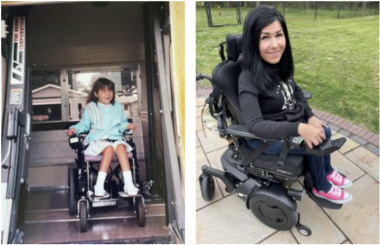Embracing the Growing Pains of New Wheels


As a tiny tot, I crawled everywhere. I was the daintiest crouched explorer my backyard habitat had ever known.
Once I crawled, my family soon beckoned me to begin walking. That’s how the sequence of life works, after all.
When we’re given the breath of life, it comes with an air of expectation. Toy shop trinkets and soothing lullabies are potent distractions in the appraisal of good fortune that ensues once the inaugural swaddling blankets have been tucked and bundled just right.
A roster of milestones unfolds. Critical eyes begin to take inventory, signaling a customary sequence of organic development. The tallies add up, enumerating the perceived worth of the tiny body under scrutiny.
It’s not commonplace to deviate from the roster, and fervently discouraged to do so. We must cry, blink, focus, and react to sounds. We suckle nutrition and develop taste. We grasp objects, hold our head high, wiggle in delight, and sit unattended. We roll over, kick our heels, interact with kindred hearts, and crawl.
We pull ourselves up on wobbly legs, gather composure, and take a stand. We place one foot ahead of the other, ready to greet the world on our front porch. We attempt the first step.
And sometimes, we collapse.
My first power wheelchair was a dream of maneuverability for my kindergarten kid spirit. It had a lavender seat, gripping tires for coarse paths of adventure, and a joystick that mimicked a compass, allowing me to pilot thermal winds of adaptability.
It reinforced the notion that I was worthy of experiencing life no matter what physical condition my body was born into, even if it deviated from societal norms.
Prior to that point in my life, I relied on a manual wheelchair or the arms of a caregiver to transport me anywhere. Hearing the words “wheelchair-bound” may have set off a ring of devastation within my parents’ ears, but for me, this newfound contraption of independence was a wondrous gift. There was a great big world out there — the bus to kindergarten was waiting for me, and there was no time to waste wishing I could walk instead of roll.
Day after day since childhood, I’ve relied on a power wheelchair to enrich my scenery and impart a semblance of autonomy in my life. As my spirit lusts after freedom, these remarkable mobility devices help me explore the world and discover my authentic self in a way that fits my physical needs best.
Recently, I’ve been adjusting to a brand-new wheelchair.
Well overdue, I’d avoided initiating the process for several years due to painstaking measures of advocating for bright and shiny medical equipment. Insurance can be a two-faced friend, and I choose wisely when rolling up my sleeves to challenge it to a playground rumble at recess. As a result, a poorly fitted seating system grew to be a fervent contributor in the harrowing game of nerve pain I’ve been facing off against in my lower back, hips, and legs.
With each new wheelchair that’s graced my life, I’ve undergone major physical adjustments and emotional turbulence. At a certain age, we reach a point in which the faces of cycles and patterns become less blurry and more recognizable. Living with a disability, our self-awareness is often amplified.
After my new chair was broadly fitted to me by a professional technician, I transferred back into my old standby, Violet. For a few days, the newbie sat there like an orphan awaiting her homeland. I’d drive past her with sideways glances while making excuses for why each day wasn’t the right day to begin my journey with her.
Humans have a knack for rejecting the unfamiliar. When required to detach from comforts that are native to the lands of our hearts, our brains can mask pain, fooling us into infatuation with old ways.
My resistance to change manifested a crevasse when I needed a bridge. Since the fear of adjusting to my new wheelchair wasn’t subsiding, I needed to push forward through this shake-up, still afraid. I turned to my own thoughts and people around me to facilitate positive connection with my new chair.
With time and patience, caregivers fine-tuned newfound sweet spots for my butt, headrest, and foot plates. My dad modified furniture to a better fitting height for my legs.
I breathed through the difficult emotions, considering how grateful I am to be uplifted by various wheelchairs since childhood. I called my new chair Firefly — a suitable name, as she’s equipped with headlights, turn signals, and hazards, and I noticed the first firefly of the season on the day we met.
Even when we don’t feel ready to reinvent ourselves through innovation and adaptation, we’re often nudged into new directions. From kindergarten to adulthood, life is not always about growing, but outgrowing.

Katie’s first childhood power wheelchair, and her new one, aptly named Firefly. (Courtesy of Katie Napiwocki)
***
Note: SMA News Today is strictly a news and information website about the disease. It does not provide medical advice, diagnosis, or treatment. This content is not intended to be a substitute for professional medical advice, diagnosis, or treatment. Always seek the advice of your physician or other qualified health provider with any questions you may have regarding a medical condition. Never disregard professional medical advice or delay in seeking it because of something you have read on this website. The opinions expressed in this column are not those of SMA News Today, or its parent company, BioNews, and are intended to spark discussion about issues pertaining to spinal muscular atrophy.
The post Embracing the Growing Pains of New Wheels appeared first on SMA News Today.



